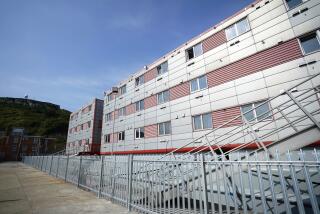Garbage Out, Garbage In, Islip Decides
- Share via
HOLBROOK, N.Y. — The garbage-laden barge that has been rejected by six states and three foreign countries can go home to Islip, the town’s top official said Tuesday.
“We’re probably going to put some yellow ribbons outside the gates of the landfill to welcome our garbage back,” Islip Town Supervisor Frank Jones said.
“We agreed we would take back the Islip barge if and when it were delivered to our gates,” Jones said Tuesday after he returned from Albany, where he signed a consent agreement with the state. The new pact will permit Islip’s landfill to be expanded along strict guidelines designed to protect Long Island’s underground water supply.
Jones said the barge owner had not yet decided whether to return the refuse to Long Island City in Queens, from where it could be trucked to the dump. The barge was southeast of Savannah, Ga., on Tuesday and was moving north.
Talks between Islip and state officials, which led to the landfill agreement, were begun at the urging of Gov. Mario M. Cuomo at about the same time the barge left Long Island City on March 22, Jones said.
Although the barge’s wanderings off the East Coast focused attention on the problem, it was not the reason for the agreement, Jones said. He said it will cost the town about $2 million to make necessary changes and provide special monitoring of the 84-acre dump, he said.
“The barge almost became secondary to the solution,” Jones said. “The realization was that there was a real problem, a problem all communities are facing.”
The consent agreement allows the town to fill its hazardous waste site to a steeper slope than previously permitted, said Henry G. Williams, commissioner of the state Environmental Conservation Department. The state in 1983 had ordered all Long Island landfills closed in 1991, and that deadline stands.
Islip must clean up the hazardous wastes but, under state law, will be eligible to apply for a 75% subsidy of the cost, Williams said.
The town also must institute mandatory recycling of all residential and commercial wastes, toward a goal of 50% recycling of all trash by 1997, he said.
More to Read
Sign up for Essential California
The most important California stories and recommendations in your inbox every morning.
You may occasionally receive promotional content from the Los Angeles Times.













